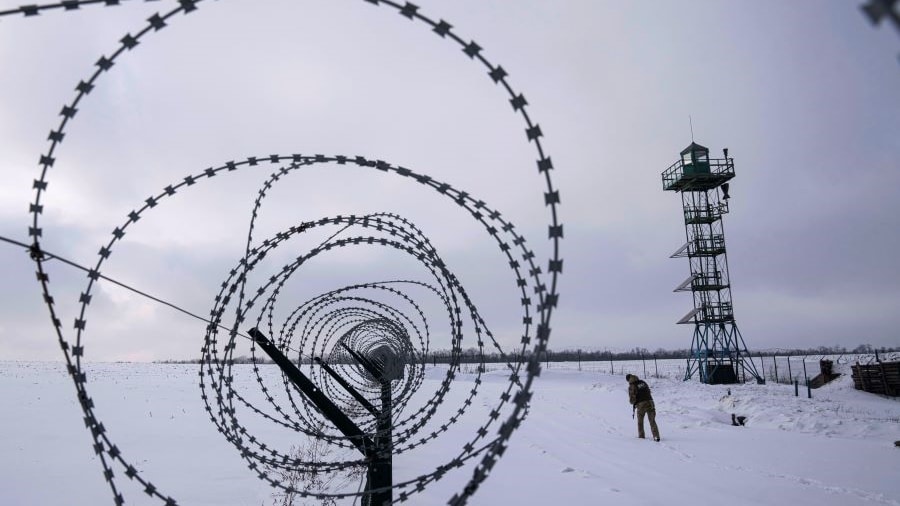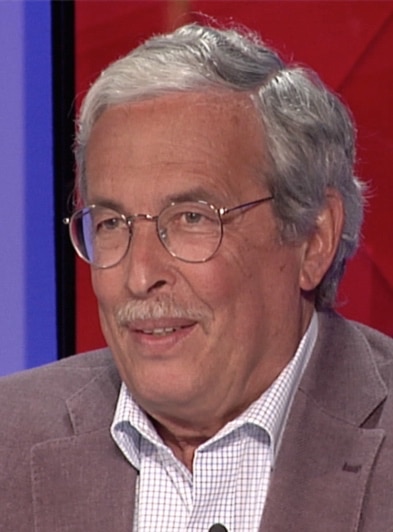Reminiscent of tensions during the Cold War, the Ukraine crisis represents the most serious East-West confrontation since the end of the Soviet Union.

A Ukrainian guard patrols the border with Russia near Hoptivka village, Kharkiv region, Ukraine, 2 February 2022. (AP Photo/Evgeniy Maloletka)
The build-up of Russian troops on the eastern border of Ukraine, the sending of additional American troops to Europe and skirmishes in eastern Ukraine that have left over 13,000 dead are indications of a crisis similar to the worst that took place during the Cold War.
While not yet as dramatic as the Cuban Missile Crisis of 1962 when Soviet missiles were revealed in Cuba, it is the most serious East-West confrontation since the end of the Soviet Union in 1991.
With the implosion of the Soviet Union and the end of its security alliance, the Warsaw Pact, in 1991, the general security architecture of Europe has been in flux. Numerous newly independent countries and former members of the Warsaw Pact joined the European Union and the North Atlantic Treaty Organization (NATO).
But Ukraine, a country larger than France and second in size only to Russia in Europe, remained technically outside the Western orbit after its 1991 independence.
Russia has historical ties to Ukraine.
Historically closely tied to Russia, Ukraine became part of the Soviet Union after World War Two. More than half of the two million people in the separatist regions are Russian, and the Russian language is often spoken in the eastern part of Ukraine.
In addition, Ukraine has a strategic position in Eastern Europe, being on the northern shore of the Black Sea, bordering several European countries and with a border with Russia to the east.
The Russian Federation has been violently opposed to the eastern expansion of NATO. Ukraine and Georgia were promised eventual membership in NATO at the Bucharest NATO Ministerial meeting in 2008.
Russia maintains that it was orally promised no further NATO expansion after 1997 by the American official James Baker in return for its non-interference in the reunification of East and West Germany. The United States maintains that no promise was made. No written evidence exists.
To guarantee security on its borders — what it refers to as “the near abroad” — the Russian Federation has increased its control of surrounding areas by winning a war with Georgia in 2008 and taking over South Ossetia and Abkhazia on its southern border. It also took control of Crimea from Ukraine in 2014.
NATO troop exercises on its border as well as the placing of missiles have increased Russia’s calls for greater clarification of Ukraine’s status. The Russians have asked for a written guarantee that Ukraine will never join NATO. The Russians argue that the presence of NATO troops, missiles and exercises around its borders threaten its security.
U.S. and West say Ukraine must be free to choose its allies.
For the West and the United States, it is unacceptable that an independent Ukraine would not be able to decide which alliance it could join. While Ukraine is far from satisfying the necessary criteria to join NATO, the Russians feel a historical alliance with Ukraine and fear that NATO troops could end up on its border.
To complicate a unified Western response to the Russian build-up of troops, an important gas pipeline from Russia to Germany has been called into question. If a conflict broke out, the Russians say they would close off the pipeline, which serves an important role for Europe’s energy supply.
In reaction to the Russian troops and an eventual invasion of Ukraine, U.S. President Joseph Biden has threatened Russia with “swift and severe” sanctions that would seriously damage the Russian economy.
Several meetings have taken place to try to settle the crisis diplomatically. Three took place at different levels in Geneva, at NATO in Brussels and at the Organization for Security and Cooperation in Europe in Vienna.
U.S. Secretary of State Antony Blinken has met Russian Foreign Minister Sergey Lavrov bilaterally on several occasions. Various European leaders have spoken with Russian President Vladimir Putin and visited Kiev to speak with Ukrainian President Zelensky.
Possible avenues for a diplomatic solution
The Russians have demanded that the West sign a legal treaty stipulating that Ukraine will never join NATO.
Although the U.S. written response to the request has not been made officially public, it was leaked to the Spanish newspaper El Pais. In the document, Washington rejected the key Russian security demands, saying Moscow cannot be allowed to veto NATO membership, while offering to provide more transparency about missile deployments in Eastern Europe.
While the build-up of troops continues, so do diplomatic negotiations. It is relevant to remember that the conclusion to the Cuban Missile crisis of 1962 was that the Soviet Union withdrew its missiles from Cuba. In return, but less publicly acknowledged, the United States withdrew its missiles from Turkey, near its border with Russia.
The current negotiations have become very media-oriented, with each side presenting its arguments in public. There is little information from Putin about his negotiation positions except his insistence that Ukraine never join NATO. The United States has insisted that it will not accept that position.
However, there are possible avenues for agreement that could consider demilitarizing the eastern border of Ukraine and limiting the number of troops and missiles close to Russia. Russia now basically controls several eastern districts of Ukraine, so it would be necessary to see how those districts could remain close to Russia while still being officially part of Ukraine.
The situation of Crimea is not part of the negotiations, and it seems to be accepted that it is now part of the Russian Federation. The status of South Ossetia, Abkhazia and Transnistria on the Moldova-Ukraine border are also not part of the negotiations.
The current crisis focus is on Ukraine, but the larger picture remains the European security architecture after the end of the Soviet Union and the role and place of NATO in this architecture. Putin maintains Russia has a genuine sphere of influence around its borders; the West maintains that the newly independent countries should be truly independent.
(For more News Decoder stories on Ukraine, click here.)
Questions to consider:
- What was the Cuban Missile Crisis, and how did it end?
- What is Russia demanding with respect to NATO’s relations with Ukraine?
- If you were a diplomat from outside of Europe, Russia or the United States, what solution might you propose for resolving the crisis over Ukraine?

Daniel Warner earned a PhD in Political Science from the Graduate Institute of International Studies in Geneva, where he was Deputy to the Director for many years as well as founder and director of several programs focusing on international organizations. He has lectured and taught internationally and is a frequent contributor to international media. He has served as an advisor to the UNHCR, ILO and NATO, and has been a consultant to the Ministries of Foreign Affairs and Defense of Switzerland as well as in the private sector.

Well considered! My fingers are crossed in hope …
When are humans (all of us) ever going to learn that wars never really solve anything except to keep the world population
down at the loss of all our lovely YOUNG men!!!